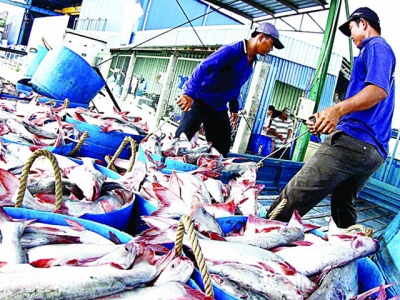US greenlights raw catfish imports from Vietnam

The US Department of Agriculture’s Food Safety and Inspection Service (FSIS) is amending the Siluriformes fish (catfish) inspection regulations to list Vietnam as a country eligible to export Siluriformes fish and fish products to the US.
Vietnamese Pangasius products meet stringent US food safety requirements
FSIS has reviewed Vietnam’s laws, regulations, and inspection system and has determined that Vietnam’s Siluriformes fish inspection system is equivalent to the system that the US has established under the Federal Meat Inspection Act (FMIA) and its implementing regulations. According to the ruling, only raw Siluriformes fish and fish products produced in certified Vietnamese establishments are eligible for export to the US. The decision will help Vietnam develop its Tra fish industry on a sustainable basis.
Overcoming barriers
The FSIS released its final rule establishing an inspection program for fish under the order Siluriformes, including catfish. The final rule, which applies to both domestically-raised and imported Siluriformes fish, was developed in order to implement provisions required by the 2014 Farm Bill. The rule became effective in March 2016, beginning an 18-month transitional implementation period for both domestic and international producers. To continue exporting catfish, mostly Tra fish, to the US, Vietnam had to build and organize its inspection system equivalent to the US one in terms of three criteria, namely the legal system on food quality and safety control; the law enforcement capacity of authorized agencies; and conditions for ensuring food safety and hygiene during the whole process from fry production, farming, transportation, processing to export to the US.
In August 2017, based on Vietnam’s request, FSIS conducted a document review of Vietnam’s Siluriformes fish inspection system to determine whether it was equivalent to that of the US. Based on its review of the submitted documentation, which included Vietnam’s laws, regulations, and inspection procedures, FSIS concluded that Vietnam’s inspection system is equivalent to the US one for raw Siluriformes fish products, specifically Siluriformes fish that fall within the FSIS product categories “Raw Product-Intact” and “Raw Product-Non-Intact.” Both product categories are defined in the “FSIS Product Categorization” document, which was developed to assist foreign governments in accurately identifying the type of meat and poultry products exported to the US.
In May 2018, an FSIS inspection team made a fact-finding trip to Vietnam and recognized that Vietnam’s inspection system in catfish production, processing and export completely meets US regulations.
The draft rule was unveiled in September 2018 to collect public opinions and won majority support. The US Department of Agriculture announced the final rule on October 31.
Vietnam has met one of the most stringent food quality and safety control requirements in Siluriformes fish production and export, which enables Tra fish products to access not only to the US but also other markets. The final rule is expected to encourage US importers to increase Tra fish purchases from Vietnam.
Competitiveness improvement needed
Apart from recognizing Vietnam’s food safety control system on catfish as equivalent to American regulations, after three years of Vietnam’s engagement in fine-tuning food safety law and enforcement, the US Department of Commerce (DOC) announced the 15th period of review (POR15) for the period from August 1, 2017 to July 31, 2018, for Vietnamese Tra and Ba Sa fish (also a variety of catfish) products. Accordingly, the Vinh Hoan and Bien Dong companies continue to be subject to a tax rate of US$0/kg; two other businesses - NTSF and CASEAMEX - will also be considered for a tax rate of US$0/kg in November 2019. This tax rate will increase Vietnam’s Tra fish export value to the US in the remaining months of 2019.
Vietnam’s Tra fish products have been subject to US anti-dumping duties since 2003, with those duties reviewed on an annual basis. The Ministry of Industry and Trade and related agencies and organizations closely eyed review developments to protect Vietnamese businesses’ legitimate rights and interests in specific cases. According to the ministry, Vietnam earned about US$550 million from exporting Tra fish to the US in 2018, and the preliminary decision on POR15 for Vietnamese Pangasius could partly help remove difficulties for Vietnam’s Pangasius exporting enterprises. Vietnam produces 1.3 million tonnes of Pangasius annually. India, Bangladesh, Indonesia and China also raise and export Pangasius, increasing competition for Vietnamese businesses.
Deputy Minister of Agriculture and Rural Development Phung Duc Tien said that according to the regulations, after recognizing Vietnam’s food safety control system on catfish as equivalent to American regulations, the US Department of Agriculture continues to monitor and periodically re-inspect the Vietnamese system. Vietnam needs to continue reviewing and implementing food safety control laws in Pangasius production and trade in order to maintain the US recognition and increase exports to the US and other markets.
According to data of the Vietnam Association of Seafood Exporters and Producers (VASEP), in the first eight months of 2019, the US spent about US$187.9 million on Pangasius imports from Vietnam and became the world’s second largest Vietnamese Pangasius importer.
Có thể bạn quan tâm
 Vietnam reduces shrimp exports to Singapore
Vietnam reduces shrimp exports to Singapore Singapore is the largest shrimp importer of Vietnam among the ASEAN, accounting for 55% of total Vietnamese shrimp value to this group and 0.9% of total volume
 Export of tra fish expected to reach $2.06 billion this year
Export of tra fish expected to reach $2.06 billion this year Việt Nam’s export of tra fish is forecast to reach US$2.06 billion this year, decreasing by 9 per cent year-on-year
 Land-based drip-irrigated culture of sea lettuce
Land-based drip-irrigated culture of sea lettuce The use of recirculating drip irrigation culture methods for growing macroalgae like sea lettuce in controlled environments on land is a new and mostly untried